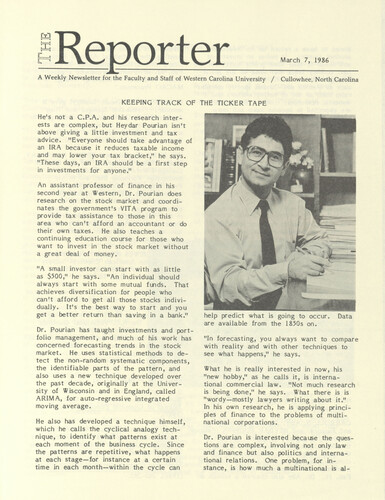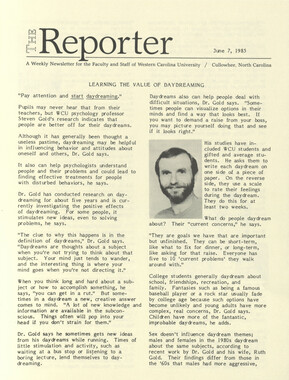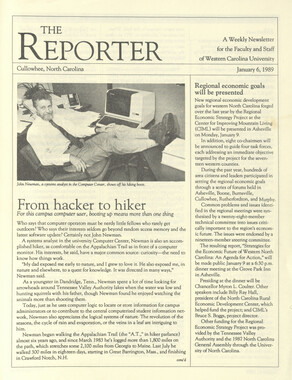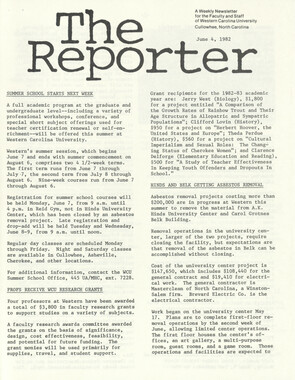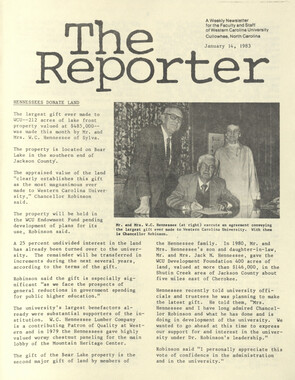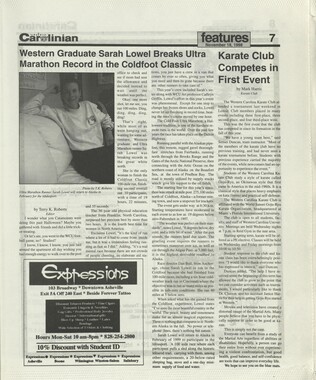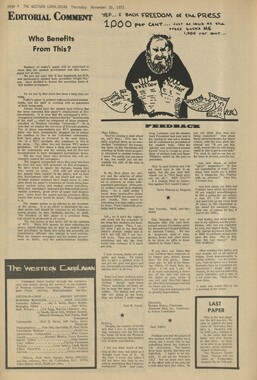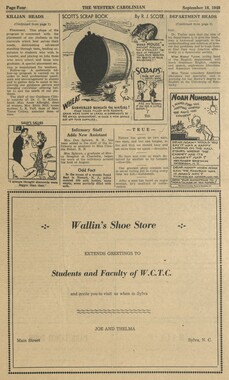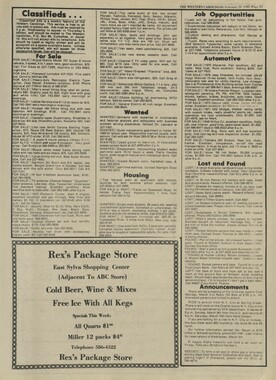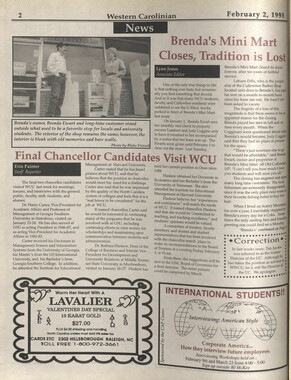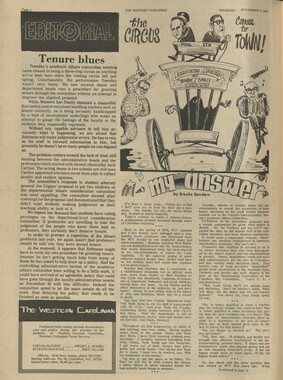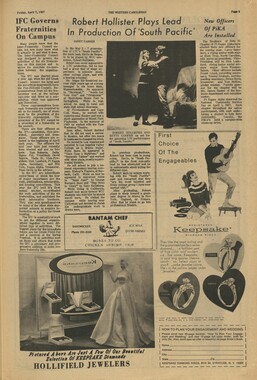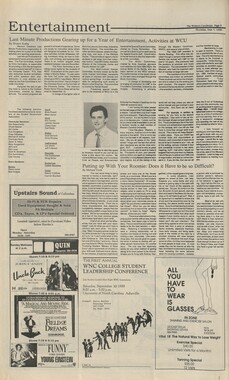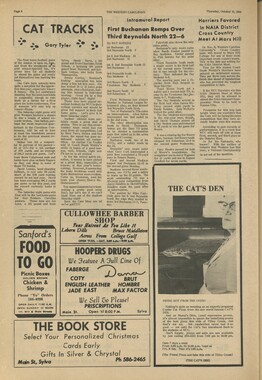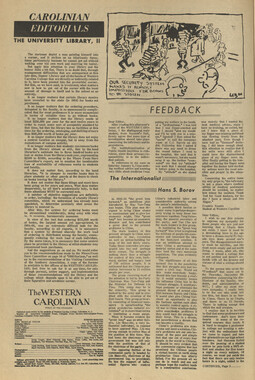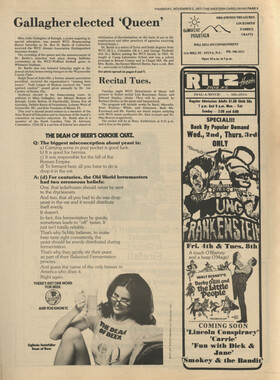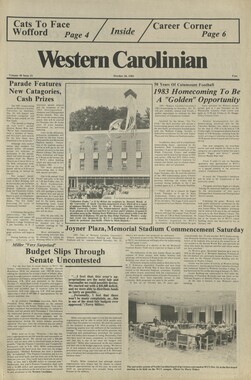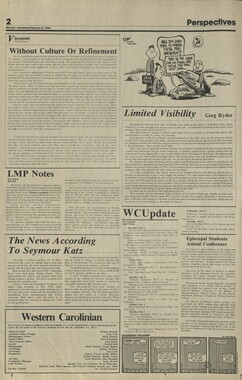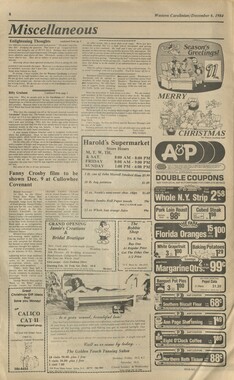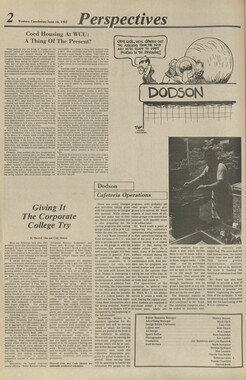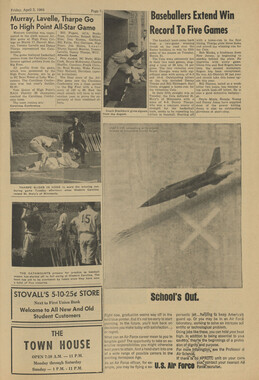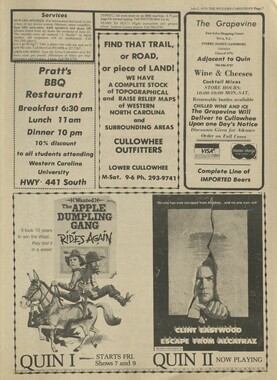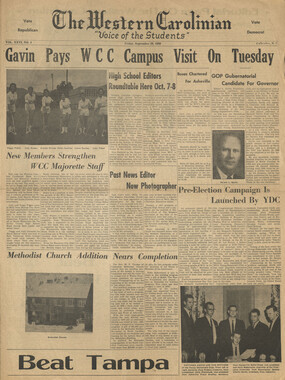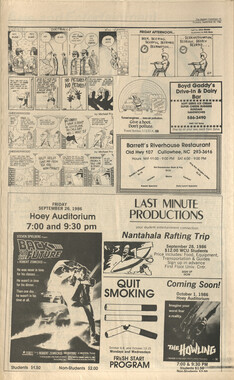Western Carolina University (20)
View all
- Canton Champion Fibre Company (2308)
- Cherokee Traditions (293)
- Civil War in Southern Appalachia (165)
- Craft Revival (1942)
- Great Smoky Mountains - A Park for America (2767)
- Highlights from Western Carolina University (430)
- Horace Kephart (941)
- Journeys Through Jackson (154)
- LGBTQIA+ Archive of Jackson County (26)
- Oral Histories of Western North Carolina (314)
- Picturing Appalachia (6772)
- Stories of Mountain Folk (413)
- Travel Western North Carolina (160)
- Western Carolina University Fine Art Museum Vitreograph Collection (129)
- Western Carolina University Herbarium (92)
- Western Carolina University: Making Memories (708)
- Western Carolina University Publications (2283)
- Western Carolina University Restricted Electronic Theses and Dissertations (146)
- Western North Carolina Regional Maps (71)
- World War II in Southern Appalachia (131)
University of North Carolina Asheville (6)
View all
- Allanstand Cottage Industries (62)
- Appalachian National Park Association (53)
- Bennett, Kelly, 1890-1974 (1388)
- Berry, Walter (76)
- Brasstown Carvers (40)
- Carver, George Washington, 1864?-1943 (26)
- Cathey, Joseph, 1803-1874 (1)
- Champion Fibre Company (233)
- Champion Paper and Fibre Company (297)
- Cherokee Indian Fair Association (16)
- Cherokee Language Program (22)
- Crowe, Amanda (40)
- Edmonston, Thomas Benton, 1842-1907 (7)
- Ensley, A. L. (Abraham Lincoln), 1865-1948 (275)
- Fromer, Irving Rhodes, 1913-1994 (70)
- George Butz (BFS 1907) (46)
- Goodrich, Frances Louisa (120)
- Grant, George Alexander, 1891-1964 (96)
- Heard, Marian Gladys (60)
- Kephart, Calvin, 1883-1969 (15)
- Kephart, Horace, 1862-1931 (313)
- Kephart, Laura, 1862-1954 (39)
- Laney, Gideon Thomas, 1889-1976 (439)
- Masa, George, 1881-1933 (61)
- McElhinney, William Julian, 1896-1953 (44)
- Niggli, Josephina, 1910-1983 (10)
- North Carolina Park Commission (105)
- Osborne, Kezia Stradley (9)
- Owens, Samuel Robert, 1918-1995 (11)
- Penland Weavers and Potters (36)
- Roberts, Vivienne (15)
- Roth, Albert, 1890-1974 (142)
- Schenck, Carl Alwin, 1868-1955 (1)
- Sherrill's Photography Studio (2565)
- Southern Highland Handicraft Guild (127)
- Southern Highlanders, Inc. (71)
- Stalcup, Jesse Bryson (46)
- Stearns, I. K. (213)
- Thompson, James Edward, 1880-1976 (226)
- United States. Indian Arts and Crafts Board (130)
- USFS (683)
- Vance, Zebulon Baird, 1830-1894 (1)
- Weaver, Zebulon, 1872-1948 (58)
- Western Carolina College (230)
- Western Carolina Teachers College (282)
- Western Carolina University (1794)
- Western Carolina University. Mountain Heritage Center (18)
- Whitman, Walt, 1819-1892 (10)
- Wilburn, Hiram Coleman, 1880-1967 (73)
- Williams, Isadora (3)
- Cain, Doreyl Ammons (0)
- Crittenden, Lorraine (0)
- Rhodes, Judy (0)
- Smith, Edward Clark (0)
- Appalachian Region, Southern (2399)
- Asheville (N.C.) (1917)
- Avery County (N.C.) (26)
- Blount County (Tenn.) (161)
- Buncombe County (N.C.) (1671)
- Cherokee County (N.C.) (283)
- Clay County (N.C.) (555)
- Graham County (N.C.) (233)
- Great Smoky Mountains National Park (N.C. and Tenn.) (510)
- Haywood County (N.C.) (3522)
- Henderson County (N.C.) (70)
- Jackson County (N.C.) (4692)
- Knox County (Tenn.) (25)
- Knoxville (Tenn.) (12)
- Lake Santeetlah (N.C.) (10)
- Macon County (N.C.) (420)
- Madison County (N.C.) (211)
- McDowell County (N.C.) (39)
- Mitchell County (N.C.) (132)
- Polk County (N.C.) (35)
- Qualla Boundary (981)
- Rutherford County (N.C.) (76)
- Swain County (N.C.) (2113)
- Transylvania County (N.C.) (247)
- Watauga County (N.C.) (12)
- Waynesville (N.C.) (73)
- Yancey County (N.C.) (72)
- Aerial Photographs (3)
- Aerial Views (60)
- Albums (books) (4)
- Articles (1)
- Artifacts (object Genre) (228)
- Bibliographies (1)
- Biography (general Genre) (2)
- Cards (information Artifacts) (38)
- Clippings (information Artifacts) (191)
- Crafts (art Genres) (622)
- Depictions (visual Works) (21)
- Design Drawings (1)
- Drawings (visual Works) (184)
- Envelopes (73)
- Facsimiles (reproductions) (1)
- Fiction (general Genre) (4)
- Financial Records (12)
- Fliers (printed Matter) (67)
- Glass Plate Negatives (381)
- Guidebooks (2)
- Internegatives (10)
- Interviews (812)
- Land Surveys (102)
- Letters (correspondence) (1013)
- Manuscripts (documents) (619)
- Maps (documents) (177)
- Memorandums (25)
- Minutes (administrative Records) (59)
- Negatives (photographs) (5835)
- Newsletters (1285)
- Newspapers (2)
- Occupation Currency (1)
- Paintings (visual Works) (1)
- Pen And Ink Drawings (1)
- Periodicals (193)
- Personal Narratives (10)
- Photographs (12976)
- Plans (maps) (1)
- Poetry (7)
- Portraits (1960)
- Postcards (329)
- Programs (documents) (151)
- Publications (documents) (2237)
- Questionnaires (65)
- Scrapbooks (282)
- Sheet Music (2)
- Slides (photographs) (402)
- Songs (musical Compositions) (2)
- Sound Recordings (796)
- Specimens (92)
- Speeches (documents) (15)
- Tintypes (photographs) (8)
- Transcripts (322)
- Video Recordings (physical Artifacts) (23)
- Vitreographs (129)
- Text Messages (0)
- A.L. Ensley Collection (275)
- Appalachian Industrial School Records (7)
- Appalachian National Park Association Records (336)
- Axley-Meroney Collection (2)
- Bayard Wootten Photograph Collection (20)
- Bethel Rural Community Organization Collection (7)
- Blumer Collection (5)
- C.W. Slagle Collection (20)
- Canton Area Historical Museum (2110)
- Carlos C. Campbell Collection (282)
- Cataloochee History Project (65)
- Cherokee Studies Collection (4)
- Daisy Dame Photograph Album (5)
- Daniel Boone VI Collection (1)
- Doris Ulmann Photograph Collection (112)
- Elizabeth H. Lasley Collection (1)
- Elizabeth Woolworth Szold Fleharty Collection (4)
- Frank Fry Collection (95)
- George Masa Collection (173)
- Gideon Laney Collection (452)
- Hazel Scarborough Collection (2)
- Hiram C. Wilburn Papers (28)
- Historic Photographs Collection (236)
- Horace Kephart Collection (861)
- Humbard Collection (33)
- Hunter and Weaver Families Collection (1)
- I. D. Blumenthal Collection (4)
- Isadora Williams Collection (4)
- Jesse Bryson Stalcup Collection (47)
- Jim Thompson Collection (224)
- John B. Battle Collection (7)
- John C. Campbell Folk School Records (80)
- John Parris Collection (6)
- Judaculla Rock project (2)
- Kelly Bennett Collection (1407)
- Love Family Papers (11)
- Major Wiley Parris Civil War Letters (3)
- Map Collection (12)
- McFee-Misemer Civil War Letters (34)
- Mountain Heritage Center Collection (4)
- Norburn - Robertson - Thomson Families Collection (44)
- Pauline Hood Collection (7)
- Pre-Guild Collection (2)
- Qualla Arts and Crafts Mutual Collection (12)
- R.A. Romanes Collection (681)
- Rosser H. Taylor Collection (1)
- Samuel Robert Owens Collection (94)
- Sara Madison Collection (144)
- Sherrill Studio Photo Collection (2558)
- Smoky Mountains Hiking Club Collection (616)
- Stories of Mountain Folk - Radio Programs (374)
- The Reporter, Western Carolina University (510)
- Venoy and Elizabeth Reed Collection (16)
- WCU Gender and Sexuality Oral History Project (32)
- WCU Mountain Heritage Center Oral Histories (25)
- WCU Oral History Collection - Mountain People, Mountain Lives (71)
- WCU Students Newspapers Collection (1744)
- Western North Carolina Tomorrow Black Oral History Project (69)
- William Williams Stringfield Collection (2)
- Zebulon Weaver Collection (109)
- African Americans (390)
- Appalachian Trail (35)
- Artisans (521)
- Cherokee art (84)
- Cherokee artists -- North Carolina (10)
- Cherokee language (21)
- Cherokee pottery (101)
- Cherokee women (208)
- Church buildings (167)
- Civilian Conservation Corps (U.S.) (110)
- College student newspapers and periodicals (1830)
- Dams (103)
- Dance (1023)
- Education (222)
- Floods (61)
- Folk music (1015)
- Forced removal, 1813-1903 (2)
- Forest conservation (220)
- Forests and forestry (921)
- Gender nonconformity (4)
- Great Smoky Mountains National Park (N.C. and Tenn.) (181)
- Hunting (38)
- Landscape photography (10)
- Logging (103)
- Maps (84)
- Mines and mineral resources (8)
- North Carolina -- Maps (18)
- Paper industry (38)
- Postcards (255)
- Pottery (135)
- Railroad trains (71)
- Rural electrification -- North Carolina, Western (3)
- School integration -- Southern States (2)
- Segregation -- North Carolina, Western (5)
- Slavery (5)
- Sports (452)
- Storytelling (245)
- Waterfalls -- Great Smoky Mountains (N.C. and Tenn.) (66)
- Weaving -- Appalachian Region, Southern (280)
- Wood-carving -- Appalachian Region, Southern (328)
- World War, 1939-1945 (173)
The Reporter, March 1986
-
The Reporter is a publication produced by Western Carolina University featuring news, events, and campus community updates for faculty and staff. The publication began in August of 1970 and continues digitally today. Click on the link in the “Related Mate
-
-
m IH Reporter March 7, 1986 A Weekly Newsletter for the Faculty and Staff of Western Carolina University / Cullowhee, North Carolina KEEPING TRACK OF THE TICKER TAPE He's not a C.P.A. and his research interests are complex, but Heydar Pourian isn't above giving a little investment and tax advice. "Everyone should take advantage of an IRA because it reduces taxable income and may lower your tax bracket," he says. "These days, an IRA should be a first step in investments for anyone." An assistant professor of finance in his second year at Western, Dr. Pourian does research on the stock market and coordinates the government's VITA program to provide tax assistance to those in this area who can't afford an accountant or do their own taxes. He also teaches a continuing education course for those who want to invest in the stock market without a great deal of money. "A small investor can start with as little as $500," he says. "An individual should always start with some mutual funds. That achieves diversification for people who can't afford to get all those stocks individually. It's the best way to start and you get a better return than saving in a bank." Dr. Pourian has taught investments and portfolio management, and much of his work has concerned forecasting trends in the stock market. He uses statistical methods to detect the non-random systematic components, the identifiable parts of the pattern, and also uses a new technique developed over the past decade, originally at the University of Wisconsin and in England, called ARIMA, for auto-regressive integrated moving average. He also has developed a technique himself, which he calls the cyclical analogy technique, to identify what patterns exist at each moment of the business cycle. Since the patterns are repetitive, what happens at each stage—for instance at a certain time in each month—within the cycle can help predict what is going to occur, are available from the 1850s on. Data "In forecasting, you always want to compare with reality and with other techniques to see what happens," he says. What he is really interested in now, his "new hobby," as he calls it, is international commercial law. "Not much research is being done," he says. What there is is "wordy—mostly lawyers writing about it." In his own research, he is applying principles of finance to the problems of multinational corporations. Dr. Pourian is interested because the questions are complex, involving not only law and finance but also politics and international relations. One problem, for instance, is how much a multinational is al lowed to have a return on its investment in another country. It makes an investment and needs to take some profit home, but the host country feels that some of the profit belongs with the host. Nowadays countries such as Mexico and Canada specify complex rules such as use of native workers and domestic resources. Usually the workers are expected to become more and more skilled and the technology is to stay in the host country. "Many of these issues didn't exist 30 years ago," Dr. Pourian says. "Because of the ideas of political sovereignty and independence in the Third World, trade relations are becoming more and more complicated. It's not as easy as it used to be to invest and take the profits home, or to invest and make all the decisions." But he says commercial law is coming to replace "gunboat diplomacy" and reactions, once the rule. The U.S. now has to compete with other countries in international markets that we used to dominate, he says. "We are trapped according to our own philosophy. We have spread the idea of free enterprise and competition without interference, and that makes trade relationships more complex than they used to be. We need to study them more and come up with better solutions." JAMES R. NICHOLL (head, English) visited Western Kentucky University in Bowling Green Feb. 5-7 to serve as a consultant and evaluator for its department of English. BILL ANDERSON (History) gave a paper, "Cherokee Clay: From Duch6 to Wedgwood," in New York City at the Phi Alpha Theta session of the American Historical Association Dec. 29. He also presented a paper on "Notable Tennessee Cherokees" in Johnson City, Tenn., as part of the Tennessee '86 Homecoming, a year-round celebration of Tennessee history. CARROLL D. ABY, JR. (head, Economics and Finance) and HEYDAR POURIAN (Finance) presented a paper, "An Hourly Account of the Dow Jones Industrial During a 'Bull' Market: Patterns, Systematics, and Efficiencies," during the Mid-South Academy of Economics and Finance in Memphis, Tenn., Feb. 14. Dr. Aby also chaired a session on investments at the meetings. At another meeting, the Statistical Analysis Institute's international conference in Atlanta Feb. 12, Dr. Pourian presented a paper titled "Financial Forecasting Through SAS MACRO Processes." RICK HARRISON (head,. Biology) gave a seminar, "Freshwater Sponges and Their Application in Quaternary Paleoecology," to the departments of biology and earth sciences at the University of Waterloo, Waterloo, Ontario, on Friday, Feb. 22. JIM BYER (English) and BECKY KORNEGAY (Hinter Library) attended the 2nd Earlham College-Eckerd College Bibliographic Instruction Workshop Dec. 4-5 in St. Petersburg, Fla. College faculty and administrators and academic librarians discussed ways by which faculty can more effectively use the library and librarians in their teaching. The most important of these were course-related library instruction and faculty-librarian collaboration in designing assignments. D.A. MATHEWES (Chemistry and Physics) attended the American Chemical Society Conference for Local Section Officers in Memphis, Tenn., Jan. 10-12. JIM MORROW (Human Services) was honored for his contributions in vocational counseling by the N.C. Association of Counseling and Development in its annual meeting in February. The N.C. Vocational Guidance Association division presented the Roy N. Anderson Award "for leadership, meritorious service, and outstanding contributions to career guidance" to Dr. Morrow in recognition of his efforts for many years. FACULTY PUBLICATIONS D.A. Mathewes and Harvey Pooka. "Observations upon the Unified Force Operation," Journal of Chemical Education, 62, 12 (1985). Heydar Pourian and Mary Anne F. Nixon. "Foreign Corporate Investment Environment in Canada: Legal and Financial Implications of the Proposed Investment Canada Act," Selected Papers of the American Business Law Association Regional Proceedings, 12 (1986), 285-295. JAMAICAN COMMENCEMENT A LANDMARK EVENT Sixty-one teacher-students made history Saturday, March 1, as the first Jamaicans to be graduated in their homeland by an American university. "You are the ones," said Chancellor Myron Coulter, "who can make such great differences... in generations of young people. "You are the ones who will instill the sense of patriotism, of morality, or national conscience." The setting for Western's historic overseas commencement was the national Caenwood Educational Development and Demonstration Centre at the Jamaican Ministry of Education, opened by the government for the occasion. Some 500 people attended. Sixty Jamaican educators, most of them women, received bachelor of science in education degrees. One, Una May Lambert, became the first person ever to receive the WCU master's degree in overseas ceremonies. She earned it in human resources development, an area of special significance in Jamaica today. It was an evening of firsts. Dr. Coulter was the first WCU chancellor to come overseas to deliver a commencement address and award degrees to citizens of another land. If major American educational associations are right, it was the first time any American university has held an overseas commencement. Dr. Coulter, Yvonne Phillips, interim vice-chancellor for academic affairs, and Burton Fox, WCU director of international programs in the Caribbean and Latin America, conducted the commencement. Sharing the podium was Cecil Turner, Jamaica's second-ranking education official. The commencement was not held here, they said, for the sake of setting a record. "We held the commencement here because this is where most of the courses have been taught in recent years and this is where our students were," Dr. Phillips said. The university recognized "the considerable personal sacrifice and work" the Jamaican students had invested in their degrees, Dr. Coulter said. Chancellor and Mrs. Coulter met last Saturday with Ambassador Michael Sotirhos at the U.S. Embassy; two officials of the Jamaican Ministry of Education—Cecil Turner, permanent Secretary, and Euclid King, chief education officer; Jamaican Governor General Sir Florizel Glasspole; Patrick Bourke, headmaster of Priory School, the site of the WCU program; and Henry Fowler, founder of the school. The documents and maps department of Hrnter Library received its 100,000th U.S. government publication recently. Looking over the NASA document, Searching the Horizon: A History of Ames Research Center, from left: Anita Oser, head of documents and maps; Judy Young, head of public services; and Richard Llewellyn, documents library assistant. Hunter Library is a selective depository for publications issued by the U.S. government on all subjects, such as publications of the Census Bureau, Small Business Administration, NASA, and the Department of Education. COULTER PRAISES GRADUATES At their commencement March 1, Jamaican graduates heard high praise for their work and for their profession as educators. Chancellor Myron L. Coulter, delivering the commencement address, told them: "Your nation, as all other nations of the earth, will develop, flourish, and endure only as long as your educational system develops, flourishes, and endures. "There is a quickening of education going on throughout the world," he said. "The nations that have had strong educational systems for generations are placing new emphasis upon the improvement of their schools. Nations whose school systems are less sophisticated are turning their full attention to the upgrading of their programs." Western's Jamaican graduates, he said, have dedicated their careers "to the chiidren of Jamaica." ANNOUNCEMENTS Federal and state tax forms for the 1985 tax year are now available at the reference desk of Hunter Library. For federal taxes, the library has some 82 different reproducible tax forms that can be copied as needed. The frequently used Forms 1040, 1040A, and 1040EZ are in preprinted format and are free to anyone who needs them. To help the taxpayer complete the forms, a large variety of instructional pamphlets are kept with the tax forms that may be consulted but not checked out. For the first time this year, state tax forms may also be obtained at the library. They include Form D-400 plus the instruction pamphlet; Schedules A, C, E, and F; and Forms D-442 and D-453. Anyone interested in reading about the potential high level nuclear waste disposal sites in North Carolina can find the Department of Energy publications in Hunter Library at the reference desk. The materials include the Final Southeastern Environmental and Geologic Characterization Reports as well as the Response to State Comments on the Revised Draft of the Characterization Reports and the January 1986 Draft of the Area Recommendation Report. Accompanying maps and additional information are also available upon request at the reference desk. CAMPUS EVENTS Children's Theatre - A play written by WCU faculty member Stephen M. Ayers and directed by Don Loeffler will be presented in two theatre festivals March 9 and 15 and will come to the WCU campus Friday, March 21, at 7:30 p.m. in the Studio Theatre. Tickets will be $1 per person. The play concerns a little girl who fears nightmares because a witch wants to keep her in the dream. Her daddy, assisted by two of her dolls, rescues her from this predicament. Recital - Marimba virtuoso Gordon Stout, a graduate of Eastman School of Music and an assistant professor of percussion at Ithaca College, Ithaca, N.Y., will be the featured clinician-recitalist at the 1986 North Carolina Day of Percussion Thursday, March 20. He will perform in concert for the university community as part of the Lectures, Concerts, and Exhibitions Series at 8 p.m. Thursday night. Tickets are $5 for adults. Mental Gymnastics - The Western Regional OM competition, formerly called the Olympics of the Mind, will take place at Western March 21. Students from all over western North Carolina will compete in meeting intellectual challenges for which they have been preparing. Social Work Month - In celebration of Social Work Month, the WCU social work department and the Western District branch of the National Association of Social Workers is sponsoring a luicheon with the newly appointed executive director of the N.C. chapter of NASW, Kathy Boyd. The dutch treat luncheon will be at the Top of the Stairs Restaurant at noon Monday, March 24. RSVP by Friday, March 21, to Wilburn Hay den, Jr. (ext. 7112). Ms. Boyd also will give a lecture on "Social Work Commitment and the Professional Organization" at 2 p.m. March 24 in McKee 121. That evening, the Western District branch and Highlands Hospital will host a reception honoring social workers in WNC at 6:30 p.m. RSVP to Peggy Woodhall, (704) 254-3201. I Reporter A Weekly Newsletter for the Faculty and Staff of Western Carolina University March 21, 1986 / Cullowhee, North Carolina PUTTING ON THE SHOW Steve Ayers was in New York last week to see his agent. He starts shooting a two-hour pilot for ABC television March 20, just finished playing a mammoth role in Equus, is directing some 40 actors in The Great White Hope, which opens here April 11, and is seeing his children's play, Night Dreams, reach production at Western and around the region. (Catch it in the Studio Theatre Friday, March 21, at 7:30 p.m. It's just a dollar.) In spite of all this involvement and, in addition, putting the finishing touches on his Ph.D. dissertation, he wants to see what his agent might have in the works. "I've got to stay vital and working," he says. "If Western wants to have a whole record of people from our program out working in the world, we have to have someone who knows how desperate and how vital you have to be to get that role." He has directed or played roles in more than 200 productions. "I can tell students how I got those jobs," he says. He can tell them how it feels to be sitting in Central Park waiting for an audition, not knowing where your next meal is coming from. He can tell them how he caught the attention of directors he was interested in—often by sheer determination. Ayers went to Maryville College to play basketball and act before his high school graduation. In Russia with a group from the college in 1972, he decided to stay and study acting there. He worked a while in London and other European cities before returning to school. Later he acted at Opryland, played in Camelot with a company out of Nashville, acted with the Southern Illinois Repertory Company and others in such plays as Guys and Dolls, Hair, and South Pacific. In the mid-'70s, he saw an ad that read While he was in Texas, he earned a masters at the University of Houston-Clear Lake. His thesis was a directing project with Equus as the script—which helps explain his perceptive performance as the psychiatrist in Western's recent production of that play. While he was working on his doctorate at the University of Colorado, he started the Denver Center Theatre Company and played in Cyrano de Bergerac, Waiting for Lefty, Of Mice and Men, and Darwin's Sleepless Night. His children's play, Night Dreams, to be performed at Western Friday under Don Loeffler's direction, is the fourth of his children's plays to be produced. (He's also had an adult play reach production.) "It's all in verse," Ayers says. "It's in very simple rhyme and meter. I wrote it in verse because I felt like kids would like to hear it better." The play concerns a little girl, Betty Lou, who is afraid to go to sleep because she has bad dreams about a witch. "Mommy and Daddy are Ward and 3ine Cleaver types," Ayers says, referring to the TV series "Spend a Summer by the Sea" and he went to Galveston, Texas, to play in The Lone Star. He stayed in Galveston to start a theatre with a production of God-spell and was the theatre's artistic director for five years. At the Strand Street Theatre, he chose the season's plays, hired the major company, wrote grants, raised money, did publicity, and directed most of the productions. "Leave It to Beaver." They talk in platitudes, telling her it is wrong to hate the witch. Betty Lou is afraid, however, because the witch wants to keep her in the dream. Indeed, through a spelling contest, the witch does trick her into staying in the dream. When she doesn't appear at breakfast the next morning, her father has to figure out what has happened and turn the tables on the witch. The children in the audience get to help rescue Betty Lou. Ayers, who has two young children of his own, has his narrator emphasize to children that dreams at nighttime are not the kind you keep—it's the dreams you dream in the daytime that really count. He is excited about the upcoming production of The Great White Hope, the Pulitzer Prize-winning play by Howard Sackler based on the experiences of Jack Johnson, the first black heavyweight champion of the world. "I want it to be a socially vital and relevant piece of work that audience members can still enjoy as entertainment. It can be fast and exciting and still tell you something," he says. He has invited the late Sackler's wife to the opening and she has tentatively accepted. In the ABC pilot he's doing, Ayers plays a reporter from a major newspaper covering a murder in a rich family. It's directed by Corey Allen, who directed the pilot for the now-popular series Murder, She Wrote. Ayers earlier played in the movies Nashville, West of Hester Street, and Bermuda Triangle. in its Bright Ideas series of paperbacks for parents and teachers. In addition, he has been invited to work as a senior author for the Zaner Bloser spelling series. Zaner Bloser is a subsidiary of Highlights for Children, a children's publisher. JAN DAVIDSON (curator, Mountain Heritage Center) recently attended a workshop on design of exhibits conducted by the Smithsonian Institution in Washington. Davidson was one of 14 museum professionals selected to attend the weeklong seminar. JOE MEIGS (English) read a paper, "Rebirth in Tender Mercies," Feb. 22 at a meeting of the Tennessee Philological Association. A few days later, he judged the Shakespeare Recitation Contest held at Wingate College. He has also been teaching a course in Western's Certificate in Management program through Continuing Education. SACS TEAM ARRIVING SUNDAY Students, faculty members, administrators, and staff members should be alert next week as the team for the Southern Association of Colleges and Schools comes to campus in preparation for reaffirmation of Western's accreditation. During the three-day visit, the team's 14 members will want to talk to and interview people in every area of campus life. Let your classes know about the visit. Students should expect members of the visiting team to speak to them informally in the cafeterias and around the campus. He's at Western because, he says, "I'm As reported earlier, copies of the Insti-really concerned about where young actors tutional Self-Study Report are available in are coming from. Western can be a dynamite every department or at the circulation desk proving ground for young actors." in Hunter Library. In addition, reports on the school and departmental self-studies are available in the respective departmen- RICHARD GENTRY (director, Reading Center) tal and school offices. A complete set of was a featured speaker at "Reading for the the 35 departmental and five school reports Love of It," a Language Arts Conference in are on reserve at the circulation desk. Toronto, Canada, on Feb. 14 and 15. His presentation was entitled "Invented Spell- Anyone who would like to discuss the ing: Powerful Tool of the Beginning Wri- university Self-Study with the visiting ter." The conference drew over 4,000 teach- committee may attend an open meeting with ers and educators from Canada, the U.S., Richard C. Meyer, chairperson, and other Great Britain, Australia, and New Zealand. committee members on Tuesday, March 25, at His book on how to teach spelling will be 1:30 p.m. in the Faculty Conference Room, published next January by Scholastic, Inc., Hmter Library. TASK FORCE ON AIDS AT WORK In response to a mandate from UNC President William Friday for all UNC campuses, Chancellor Myron Coulter has appointed a task force on the problem of AIDS, or Acquired Immune Deficiency Syndrome. According to Donald O'Neal, director of the university's health service and chairman of the task force, the group has begun its work of educating the university community about the disease and how to prevent it. President Friday has declared that persons who show signs of infection with the AIDS virus, whether or not they are in an active disease phase, will not be excluded from enrollment or employment or restricted in access to the university's facilities and services, except when medically based judgments in individual cases rule that is best for the welfare of the individual or for the welfare of others in the university. Persons who know or have reason to believe they have been infected are encouraged to share that information in confidence with a doctor at the university health service, and they are expected to seek expert advice on how to conduct themselves responsibly in accordance with such knowledge. "We need to know if someone has symptoms of AIDS-related complex so we can treat him or her accordingly," Dr. O'Neal said. Since the immune system is weakened by AIDS, affected people are vulnerable to all kinds of infections. He also said that, in accordance with the mandate from Dr. Friday, the university will publicize the safety guidelines for the handling of blood and other body fluids and secretions, both in health facilities and other contexts where such fluids may be encountered. Contact with infected fluids, particularly through a cut or similar break in the skin, is the main way AIDS is contracted. Beyond its educational function, the Chancellor's Task Force will form a group who remain knowledgeable about the disease and related legal questions so that appropriate judgments may be made in individual cases, should students or employees of the university contract AIDS. There have been three cases of AIDS in the UNC system, Dr. O'Neal said, though none at Western. The number of cases in the state, now about 90, is growing rapidly, he said, and two men in Asheville have died of AIDS in recent months. "We're trying to educate people to help when and if it does hit our campus," he said. Members of the task force, in addition to Dr. O'Neal, are J.C. Alexander, chairman of the faculty; Susan Dyal, staff nurse at the infirmary; Fred Hinson, associate professor of biology; Jim Holland, director of personnel; Richard Kucharski, university legal counsel; Mary Sue Maginnis, associate professor of health, physical education, and recreation; Joel Milner, professor of psychology; Randy Rice, director of housing; John Ritchie, director of counseling in the CAP Center; Dan Southern, director of the medical technology program; Jean Harris, R.N. and William Aldis, M.D., C.J. Harris Hospital; Lewis Beck, R.N., Jackson County Health Department; and students Richard Griffin, Lynette James, Randy Rosenthal, and Todd Davis. SHULER COMMENDED BY STATE Roy Shuler, purchasing agent for the university, was recently commended by N.C. Department of Human Resources, Division of Facility Services, and by the N.C. Department of Crime Control and Public Safety for his response to the accident on 1-40 Feb. 4 involving a truck carrying radioactive material. Shuler, who has had extensive training in radiation monitoring from the Department of Crime Control and Public Safety, was asked to get to the site of the accident as quickly as possible and advise the Highway Patrol on what to do. In this case, the second of two trailers had broken free and spilled its cargo over a 100-yard area. Because there were several cartons of low-level radioisotopes on the truck, which was en route from Ft. Bragg to Sacramento, Calif., it was necessary to find all the boxes and monitor them with a Geiger counter. As it turned out, the canisters had not been breached and were safe to handle. According to Dayne H. Brown, chief of the Radiation Protection Section of the Department of Human Resources, in a letter to Chancellor Myron Coulter, Shuler not only responded "in less than one hour compared to the minimum of five hours which would have been required for us to respond; but also did so in a most knowledgeable and professional manner. I believe that this is an excellent reflection upon your institution and especially upon those members of your staff who have personally sought and obtained radiation emergency training." ELECTION RESULTS ARE IN In the recent university-wide election, J.C. Alexander was reelected chairman of the faculty and Jane Schulz was elected delegate to the UNC Faculty Assembly, with Eleanor Lofquist as alternate. New members also were elected for several committees. To the Chancellor's Advisory Committee, Jennie Hinter, Dincan Tye, and Henry Mainwaring were elected. Austin Spencer, Barbara Capps, and Jack McFadden are new members of the Faculty Grievance Committee. The Faculty Hearing Committee now includes Chuck Taylor, Ron Morgan, and Joe Beck. The Committee on Nominations, Elections, and Committees has Steve Eberly, Charles Darden, and Austin Spencer as new members. COMING EVENTS Pre-Retirement Conference - A conference for employees 60 years of age or older, or who are otherwise eligible to retire, or who deal with retirement matters, will be held from 9:30 a.m. until noon March 25 in the Cherokee Room of Hinds University Center. The conference, offered by the Retirement and Health Benefits Division of the Teachers' and State Employees' Retirement System, will provide complete information about procedures in the retirement process, eligibility for retirement, calculation of benefits, selection of optional payment arrangements, and completion of forms. Also covered will be eligibility requirements for Social Security benefits, hospital-medical coverage, designation of beneficiaries, and other benefits available to retiring teachers and state employees. Interested persons should contact their Freshman guard Floyd Showers cuts down the net after Western's last basketball game in Reid Gym. The Catamounts defeated Campbell University 61-59. Next season's games will be played in the Ramsey Activity Center. (Photo by Mark Haskett) supervisors to make arrangements to attend. Personal Development Workshop - If you are a woman who finds it hard to develop your life while balancing education, com-minity involvement, home, and family, or who is considering changes in your career or personal life, you may be interested in a workshop sponsored by the Jackson County Chamber of Commerce April 10. It will be led by Marilyn Huff, president of Huff Associates in Asheville, a company that specializes in consulting, leadership training, self-management, and interpersonal skills. Her topic will be "The Three C's... Choices, Challenges, and Consequences: The Balancing Act?" The workshop will be held from 7 until 9:^5 p.m. in the Asbury Room of Sylva's First United Methodist Church. The fee is $5, but scholarships are available. Call 586-2155 for more information. ANNOUNCEMENT Until further notice, supervisors of SPA employees may approve up to one and one-half hours of paid leave to permit SPA employees to donate blood. I Reporter A Weekly Newsletter for the Faculty and Staff of Western Carolina University March 28, 1986 / Cullowhee, North Carolina TRACING CHEROKEE HISTORY If you had told him ten years ago that this month he'd be putting out the first edition of a newsletter on Cherokees and running a conference on the Cherokee Removal, Bill Anderson of Western's history department wouldn't have believed you. His specialty, after all, was eighteenth-century Europe. He still teaches the French Revolution and the Napoleonic period, but he's becoming known now as Western's specialist on Cherokee history. It's all Jim Lewis's fault, really. In the late 1970s, when Dr. Lewis discovered a large body of material on the Cherokees in Spanish archives of the colonial period, he tipped off Dr. Anderson that similar material might be found in England and France. The two history professors obtained several grants from the National Endowment for the Humanities, amounting to $150,000 with matching money from WCU, to find, copy, and bring back to Cullowhee the various documents. Now the collection is available at Western and at the Museum of the Cherokee Indian in Cherokee. In 1983, they published a 751-page directory for use of the documents. Dr. Lewis returned to his former pursuits in Spanish history, but Dr. Anderson has made a deliberate effort to fill the gap left at Western when Theda Perdue, a Cherokee specialist, left the history faculty. Last spring he undertook an intensive reading course on Indian history under John Finger at the University of Tennessee. Since then he has audited a course on Cherokee language, attended a selective conference at the Smithsonian sponsored by the Newberry Library, delivered a paper on Cherokee clay at the Phi Alpha Theta session of the American Historical Association in New York, and given a paper on "Notable Tennessee Cherokees" at East Tennessee State as part of a state-wide celebration And now, just after publishing the first edition of Talking Leaves, a newsletter on Indians of North Carolina, he's running a conference for which he obtained a grant from the N.C. Humanities Committee. "Talking leaves" was a term used by Sequoyah for the way the white man communicated by writing on leaves of paper. He invented an alphabet so that the Cherokee language could be written down, and it was used to produce a newspaper and books at a printing press in Georgia. Such signs of "civilization" led Americans from as far away as Boston to oppose the Removal. The newsletter is aimed at all five tribes of Tennessee history recognized by the state of North Carolina. Besides the Cherokees, the only native Americans in North Carolina who are recognized by the federal government, we have the Lumbees, who constitute the largest tribe, the Waccamaw-Siouan, the Coharie, and the Hallwa-Saponi. Together they number more than 65,000. Dr. Anderson has sent Talking Leaves to tribal council members, native American associations, libraries and chambers of commerce, and history departments in institutions of higher learning in North Carolina. The first issue carries a list of scholarships available only to native Americans and other articles of interest. It features the conference Dr. Anderson has organized on the Cherokee Removal from their lands in Georgia, Tennessee, North Carolina, and Alabama in the 1820s and 1830s. Planned for April 4-5, the conference brings together many prominent scholars to discuss political, religious, social, and cultural aspects of the Removal, which included but was not limited to the infamous "Trail of Tears" in 1838. "All of the scholars have published books or many articles on the Removal," Dr. Anderson says. The banquet presentation is on the Keetoowah Society and features Cherokee medicine man Crosslin Smith, whose great-grandfather, Redbird Smith, revived the society as an effort to preserve traditional Cherokee culture. Also present to show his award-winning documentary, "Spirit of the Fire," will be Sam Jones, a newscaster at KJRH-TV in Tulsa, Okla. The society was formerly kept secret, but one of its prophecies was that a white man would come to tell the story of the Keetoowah. Jones was permitted to make the film because the Cherokee believed him to be that man. The Keetoowah Society has in its possession the sacred wampum belts of the Cherokee, Dr. Anderson says. These tell the history of the tribe from its earliest beginnings. The society encourages ceremonies and other traditions to preserve Cherokee identity even though the tribe is now divided into the Eastern and Western bands. Removal came about with the New Echota Treaty, which ceded the last Cherokee lands in the east to the United States. When the government announced the treaty in 1835 and called Cherokees to vote on it, it stipulated that any Cherokee not attending would count as voting for the treaty. But Cherokees traditionally did not vote no; if they could not vote yes, they did not vote at all. With only 100 votes for, the treaty was passed. Although Chief John Ross got together 15,000 names repudiating the treaty, the Removal began in 1836. Ross himself led one group of the 16,000 who travelled two years later on what became known as the "Trail of Tears" because so many people died along the way. Many injustices accompanied the Removal itself, Dr. Anderson points out, partly because the federal government and Georgia wanted it carried out as quickly and cheaply as possible. "Great fortunes could be made overnight," he says. People who contracted to supply food gave the Indians meat so bad it killed their horses; it had been condemned by the U.S. Army two years earlier. The grain was full of maggots. Federal agents who were to help transport the Cherokees across the Mississippi were never told when or where to expect them. Those who went to Oklahoma joined Cherokees called "Old Settlers" who had been arriving there since the 1790s. Among them were Cherokees who had moved from North Carolina after the treaty of 1819, which ceded most Cherokee lands in this state. Together they have become the Western Band. By the terms of that 1819 treaty, many full-blooded Cherokees had earlier bought land and left the Cherokee Nation to become citizens of North Carolina. These had a legal right to stay when the Removal took place and they became the nucleus of the Eastern Band. They have been joined by descendants of those who were spared Removal because they helped catch and kill the rebellious Tsali, and by descendants of others who hid in the hills until it was safe to emerge. Dr. Anderson's own recent research concerns Cherokee clay. A Georgian named Duche first discovered the secret for making porcelain like the Chinese in the New World: it was to be found in the ingredients of Cherokee clay, mined north of what is now Franklin. He took the idea to England and over the next 20 years several people experimented and applied for patents. Then, in 1767, the Englishman Josiah Wedgwood sent an agent, Thomas Griffiths, who brought back five tons of the clay. It was used in making the distinctive blue-and- white china known as jasperware and now identified with the Wedgwood name. Dr. Anderson, who is publishing his research, including Griffiths' travel journal, says that the story provides an interesting picture of 18th-century life in the wild back country of the Carolinas and Georgia, when dangers were everywhere and there was no formal system of justice. Last summer, Dr. Anderson says, Wedgwood got another supply of the clay to make a limited edition commemorative bowl and plate for the 400th anniversary of North Carolina. Suggested by Betty Magnum, a Lumbee who is director of Indian education in North Carolina, and commissioned by Ivey's, the dishes carry illustrations of Indian activities based on watercolors by an artist who accompanied Sir Walter Raleigh in 1585. TRUSTEES APPROVE DOCUMENT Among other actions taken at their March 18 meeting, Western's board of trustees adopted a retrenchment document which was initiated in 1979 and was approved by the Faculty Senate December 9. According to Chancellor Myron Coulter, the university does not expect a reduction in force, but the document "puts in place a plan in the event that the state of North Carolina declares a state of financial exigency. The intent is to put it in a drawer and never use it. There is no emergency now, and none is anticipated." In reference to a plan to raise funds for distinguished professorships at Western, Dr. Coulter told the board that we hope to have one or more such professorships by the time of the centennial. The legislature has provided for grants of $334,000 to UNC-Chapel Hill and N.C. State and grants of $167,000 to each of the other 14 UNC universities, provided that the recipients raise twice that amount themselves. If they raise more, they can ask for more than the $167,000. Two plans have been devised. Following Plan A, we have asked permission to raise $668,000 to earn a double amount of state funds, or $334,000. That would total $1 million. By Plan B, we would raise $334,000 to get $167,000. If we succeed at Plan A, we could support an endowed chair. Plan B would support a distinguished professorship. In a report on the N.C. Center for the Advancement of Teaching, the board learned that four fellows are being selected from outstanding candidates for the non-tenure track positions. Eight semifinalists have been interviewed for the director's position. Finalists will be invited to the campus. The semifinalists have rich backgrounds with national reputations. Promotions were recommended for six faculty members. Eva 3. Adcock (Music), James C. Addison, Jr. (English), Aaron K. Ball, and Donald C. Wood (Industrial Education and Technology) were promoted to associate professor. William L. Anderson and Gerald Schwartz (both History) were promoted to professor. WATERS RESIGNS AS DIRECTOR Chancellor Myron Coulter told Western's board of trustees March 18 that Bob Waters has resigned effective June 30 as WCU athletics director but will continue as head football coach. Waters said he wants to devote full time to his coaching duties because a neuromuscular disorder has made it difficult to meet the double demands of the joint position, a dual responsibility he has had since 1971. Dr. Coulter said a new, separate position of athletics director will be established and a search begun to fill it by the time Waters' resignation is effective. Western was the only school in the Southern Conference that did not have or plan to have a full-time athletics director. Dr. Coulter said in Waters' 15 years as athletics director "he has built the strong est total program in the history of the university and one of the outstanding programs in the Southern Conference. I just cannot say enough about the importance to the entire university of what Bob has done as the director of our athletics program." At the same time, Dr. Coulter said, "I respect Bob's decision to concentrate full time on coaching. He will continue to have my total support in that position. He's one of the best football coaches I have ever known. He puts an exciting team on the field every year, and we plan for him to keep on doing that for a long time." MANDRELL TO SING AT CENTER OPENING The $16 million Liston B. Ramsey Regional Activity Center at Western will open Saturday, April 19, with dedication ceremonies and a concert by entertainer Louise Mandrell. Liston B. Ramsey, Speaker of the N.C. House, will be the guest of honor. The program will begin with dedication ceremonies at 7 p.m. featuring a Grand Chorus of over 300 singers from throughout the region, accompanied by the WCU Symphonic Band. Mandrell will perform in concert following the dedication. Tickets for the program are $8 for adults, $5 for non-WCU students and elders, and $3 for WCU students. BEEFING UP RETIREMENT FUNDS If you have completed, within the last six years, 10 years of state service you may be able to increase your retirement find at low cost. Under certain conditions—if you are a former employee of another state, a former North Carolina retirement member, or a military veteran—you may purchase credit for time you were not in the state system. From the time you have completed 10 years of state service, you have up to six years to exercise your option to purchase. It is least expensive to buy within the first three years, when you will pay only the employee share of the state retirement contribution of your years not in the system — unless you are buying credit based on prior out-of-state employment, in which case you pay both employee and employer shares. In the next three years, you may still purchase credit by buying both shares. For details, call Personnel (ext. 7218). Under other legislation, full-time temporary and part-time employment may be purchased. If you were a full-time temporary state employee immediately before becoming a contributing member of the Teachers' and State Employees' Retirement System at WCU, you can buy creditable service at full cost for that employment. To be eligible to purchase credit for service as a part-time teacher or state employee, you must have been a contributing member of the Teachers' and State Employees' Retirement System for at least ten years after completing the part-time employment. The Retirement System will determine the payment, which must be made in one lump sum. Service credits may also be purchased for periods of employer-approved leave of absence when the employee was receiving benefits under the N.C. Worker's Compensation Act, if the employee was reinstated from the leave of absence with the same employer. Apply in Personnel. BATEMAN IS EOP FOR MARCH Shirley Bateman is the Educational Office Person being featured by the WCU chapter of the N.C. Association of Educational Office Personnel for the month of March. Shirley is a secretary in the department of human services, and previously worked in Admissions. A native of Winter Haven, Fla., she is a member of the state as well as the local chapter of NCAEOP. She served on the Bosses' Day Committee and coordinated the bake sale for Killian and Killian Annex. She and her husband, Floyd, have a three-year-old son, Jonathan Paul. Floyd is. media coordinator at Camp Lab School. Shirley is active in First Baptist Church of Sylva and works with young people in mission study there. She enjoys camping, boating, gardening, tennis, Softball, and vacationing in Florida.
